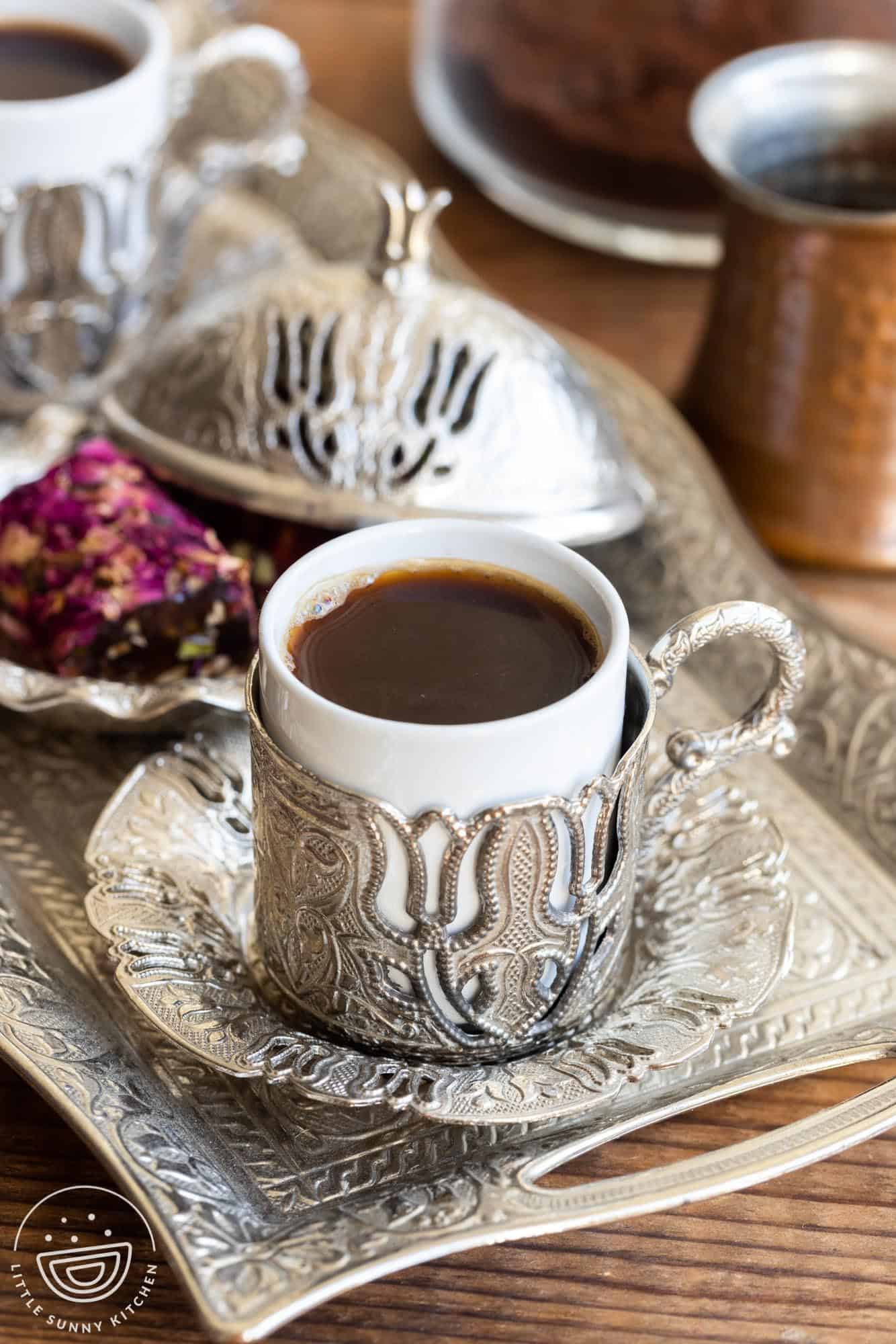From its humble beginnings to becoming a global sensation, the captivating story of Turkish coffee weaves through history and culture. Originating in the heart of the Middle East, this unique brew reflects centuries of tradition and innovation. As we explore the discovery of Turkish coffee, we’ll delve into the fascinating methods of brewing, the influence of the Ottoman Empire, and its lasting significance today. Join us on this journey to uncover the rich heritage and legends surrounding one of the world’s favorite beverages.
The Origins of Coffee
The fascinating journey of turkish coffee begins in the lush, sprawling landscapes of Ethiopia. Legend has it that a goat herder named Kaldi discovered coffee in the 9th century after noticing his goats became unusually energetic after eating the red berries of the coffee plant. Intrigued, Kaldi tried the berries himself and soon experienced a similar boost in vitality.
From Ethiopia, coffee made its way to the Arabian Peninsula. By the 15th century, it gained popularity in Yemen, where it was cultivated and brewed. The method used there laid the groundwork for what would later evolve into turkish coffee.
Notably, the brewing process became more sophisticated in this region. Here are some key points about the origins of coffee:
- Ethiopia: The birthplace of coffee, where its discovery took place.
- Yemen: The first region to cultivate and brew coffee, leading to the emergence of coffee culture.
- Trade: As coffee traveled through trade routes, it reached the Ottoman Empire, influencing how turkish coffee would be prepared and enjoyed.
Thus, the history of coffee is not merely a tale of a beverage; it is a rich tapestry of cultures and traditions that ultimately shape the modern art of brewing turkish coffee today.

The Birthplace of Turkish Coffee
Turkish coffee has a rich and vibrant history that traces its origins back to the heart of the Middle East. The earliest records indicate that coffee beans were first cultivated in Ethiopia, but the journey of these beans took a significant turn when they reached the Arabian Peninsula. Here, coffee quickly gained popularity, becoming integral to social and cultural life.
Key Locations:
- Yemen: The story begins in Yemen, where coffee was first brewed in the 15th century. The Yemeni port city of Mocha became famous for its coffee trade and paved the way for Turkish coffee’s popularity.
- Turkey: By the 16th century, coffee made its way to Istanbul, where the Ottomans embraced it fervently. The preparation methods evolved, leading to the unique brewing style that defines Turkish coffee today.
Influential Developments:
- The introduction of coffee houses, or “kahvehaneler,” in Istanbul marked a significant cultural shift. These establishments became social hubs for conversation, art, and politics.
- The addition of spices, such as cardamom, enhanced the flavor, distinguishing Turkish coffee from other coffee traditions.
In summary, the birth of Turkish coffee is a tale of cultural exchange that melded influences from Yemen and the Ottoman Empire, ultimately resulting in the rich, aromatic beverage we cherish today.
Early Methods of Brewing Coffee
The journey of Turkish coffee began long before it became the beloved beverage we know today. In the early days, brewing coffee was a simple yet fascinating process, reflecting the rich heritage surrounding this aromatic drink.
- Boiling Water: Initially, coffee beans underwent a rudimentary method of brewing. People would boil water over an open flame, introducing crushed coffee beans into the mix. This basic technique produced a strong, bold flavor.
- Use of Vessels: Brewers often used various containers to heat water, including clay pots, which imparted unique earthy tones to the beverage. However, it was the cezve (or ibrik) that revolutionized coffee-making. This small, long-handled pot allowed an even, controlled heat application, perfect for extracting flavors from ground beans.
- Idle Waiting: After boiling the mixture, the method required a moment of patience. Coffee grounds would settle to the bottom, allowing drinkers to enjoy the smooth, rich top layer without the gritty residue.
- Sugar and Spice: Interestingly, early preparations didn’t stick strictly to coffee; many added sugar and spices like cardamom to enhance the flavor profile of Turkish coffee, making it not only a drink but an experience steeped in tradition.
As methods evolved, these early brewing techniques laid the groundwork for the elaborate Turkish coffee rituals we cherish today, highlighting the cultural significance and craftsmanship involved in each cup.
The Role of the Ottoman Empire
The Ottoman Empire played a crucial role in the popularization and development of Turkish coffee. It transformed coffee from a simple beverage into a significant cultural element enjoyed by people across various social strata. Here’s how the empire influenced the coffee culture:
- Commercialization of Coffee: The Ottomans established coffeehouses known as “qahveh khaneh,” which became hubs for social interaction, entertainment, and intellectual discussions. People flocked to these venues, elevating Turkish coffee as a symbol of hospitality and community.
- Culinary Innovations: The Ottomans refined the brewing techniques and serving traditions of Turkish coffee. They introduced the use of the cezve, a special pot for making coffee, which allowed for the extraction of rich flavors. This innovation has remained a staple in coffee preparation today.
- Cultural Influence: Coffee became integral to various cultural rituals, weddings, and celebrations under Ottoman rule. The phrase “A cup of coffee commits one to forty years of friendship” illustrates its significance in forging bonds and fostering relationships.
- Spread of Coffee Culture: As the empire expanded, so did the love for Turkish coffee. The beverage spread across Europe and Asia, influencing various cultures and leading to the establishment of coffee traditions in different regions.
In summary, the Ottoman Empire not only popularized Turkish coffee but also cemented its status as a treasured cultural artifact, shaping social customs that persist to this day.

Cultural Significance of Turkish Coffee
Turkish coffee holds immense cultural significance in both Turkey and the broader Middle Eastern region. Not merely a beverage, it symbolizes hospitality, unity, and tradition. Here’s how it plays a vital role in everyday life:
- Social Rituals: Sharing a cup of Turkish coffee is a common social practice. Friends and family gather to enjoy this rich brew, fostering bonding and conversations. The phrase “Coffee first, then the talk” reflects the essential role it plays in gatherings.
- Marriage Tradition: In Turkish culture, serving coffee is intertwined with marriage customs. A bride prepares Turkish coffee for her groom’s family, showcasing her skills. An essential part of courtship, coffee drinking often signifies mutual acceptance.
- Cultural Heritage: Recognized by UNESCO, Turkish coffee is an integral component of Turkey’s intangible cultural heritage. This acknowledgment highlights its importance in the country’s identity and tradition. Its preparation and consumption rituals have been passed down through generations.
- Artistic Expression: Turkish coffee inspires art and poetry. Its preparation and serving often appear in literature, symbolizing passions and life’s intricacies. The coffee grounds left in the cup also serve as the basis for fortune-telling, adding an air of mystique.
In summary, Turkish coffee transcends mere caffeine enjoyment; it nurtures relationships, strengthens cultural ties, and fosters a sense of community. It’s an enduring legacy that continues to thrive in modern society.
The Legend of the First Coffee Roaster
The enchanting history of turkish coffee is steeped in legends, one of which tells the tale of the first coffee roaster. This captivating story revolves around a master craftsman named Kaveh, believed to have lived in the early days of coffee’s introduction to the region.
According to the legend, Kaveh discovered the method of roasting coffee beans when he stumbled upon the vibrant aroma of boiling berries. Curious and driven by a quest for flavor, he experimented with roasting them over a fire, transforming the once modest berry into a culinary delight. This marked a pivotal moment in coffee history, giving rise to the rich, aromatic turkish coffee we enjoy today.
Key highlights of this story include:
- Innovation: Kaveh’s method of roasting elevated coffee consumption, inspiring others to explore the depths of flavor.
- Cultural Impact: As coffee became central to social gatherings, Kaveh’s legacy lived on, cementing the drink’s role in communal life.
- Symbol of Craftsmanship: The art of roasting coffee became synonymous with mastery, encouraging future generations to perfect the craft.
Today, Turkish coffee remains a symbol of hospitality and tradition, honoring Kaveh’s contributions and ensuring that the aromatic brew continues to be enjoyed in homes and coffeehouses alike.
Turkish Coffee in Modern Times
In today’s fast-paced world, Turkish coffee continues to hold a significant place in both cultures and cafes around the globe. Its unique brewing method and rich flavors have not only captivated coffee enthusiasts but also inspired a revival of traditional practices. Here’s how Turkish coffee has adapted and thrived in modern times:
- Global Popularity: Once primarily enjoyed in regions of the Middle East and Europe, Turkish coffee has gained international fame. Coffee shops in major cities now offer it, introducing many to its distinctive taste and preparation rituals.
- Culinary Innovation: Modern baristas are experimenting with Turkish coffee by incorporating it into various recipes, such as coffee cocktails, desserts, and even ice creams. This innovation keeps the tradition alive while appealing to a younger audience.
- Cultural Events: Recognizing the significance of Turkish coffee, many countries host cultural festivals and competitions that celebrate this brewing method. The allure of these events attracts enthusiasts eager to learn about its history and preparation.
- Online Communities: Social media platforms have created a vibrant space for Turkish coffee lovers. From how-to videos showcasing traditional brewing techniques to recipe sharing, online communities contribute to its lasting legacy.
In summary, Turkish coffee has not only retained its cultural significance but also adapted to modern trends, ensuring that it remains a cherished beverage worldwide.
Traditional Coffee Preparation Techniques
Turkish coffee is renowned for its unique preparation methods, which are integral to its rich flavor and cultural significance. Understanding these techniques will not only enhance your appreciation for this classic brew but also enable you to recreate it authentically at home. Here are the key steps involved in preparing traditional Turkish coffee:
- Choose Quality Coffee: Opt for finely ground Arabica beans, ideally roasted specifically for Turkish coffee. The grind should resemble powdered sugar for optimal extraction.
- The Ibrik (Cezve) Method: Use a small pot called an ibrik (or cezve) made from copper or brass. This pot ensures even heat distribution, essential for brewing.
- Ratio of Ingredients: Combine water, finely ground coffee, and sugar (optional) in the ibrik. A typical ratio is 1 cup of water to 1-2 tablespoons of coffee, and sugar to taste.
- Low Heat Brewing: Place the ibrik on low heat and stir until the mixture is well blended. Gradually bring it to a simmer, allowing it to froth without boiling.
- Pouring: Remove from heat just before it bubbles over. Pour the coffee gently into small cups, distributing the foam evenly.
- Let it Settle: Allow the coffee grounds to settle for a minute before sipping. Traditional Turkish coffee is not filtered; thus, expect some grounds at the bottom.
Using these techniques, you can enjoy an authentic cup of Turkish coffee that reflects centuries of tradition. Each step plays a crucial role in achieving the perfect blend of flavors and aromas, making it a delightful experience.
Coffee Houses and Social Life
Turkish coffee does more than just wake you up; it plays a pivotal role in socializing and cultural life. Indeed, coffee houses, known as “kahvehane,” emerged as essential social hubs throughout Turkey. Here’s how these vibrant spaces influence the community:
- Gathering Spots: Coffee houses serve as focal points where friends and families come together. Whether discussing politics, playing chess, or simply enjoying each other’s company, they foster community bonds.
- Cultural Events: Many coffee houses host poetry readings and cultural performances, showcasing local talent and traditions. This makes them a rich source of cultural exchange.
- Rituals and Traditions: The act of serving Turkish coffee is often ceremonial. The preparation, presentation, and consumption become a shared ritual, reinforcing relationships. For instance, offering a cup of coffee to a guest signifies hospitality and respect.
- Inclusivity: Turkish coffee houses welcome diverse groups, creating an inclusive atmosphere. Men, women, and children often gather, breaking down social barriers.
Comparison of Traditional and Modern Coffee Houses:
| Aspect | Traditional Coffee Houses | Modern Coffee Houses |
|---|---|---|
| Atmosphere | Cozy and intimate | Trendy and casual |
| Service Style | Traditional, often slow | Quick service, casual vibe |
| Menu Variety | Primarily Turkish coffee | Diverse, including modern brews |
| Cultural Events | Frequent local events | Occasionally hosts events |
In summary, Turkish coffee houses have firmly rooted themselves in the social fabric of Turkish culture, making them indispensable gatherings for people to connect, share, and create lasting memories.
Recognition by UNESCO
The global appreciation for turkish coffee reached a significant milestone when UNESCO recognized it as an Intangible Cultural Heritage of Humanity in 2013. This acknowledgment not only honors the rich tradition surrounding turkish coffee but also emphasizes its deep-rooted cultural significance.
Why UNESCO Recognition Matters
- Cultural Preservation: The decision to include Turkish coffee in UNESCO’s list helps preserve the intricate rituals associated with its preparation and consumption, ensuring that future generations can experience this heritage.
- Global Awareness: Recognition elevates awareness about turkish coffee beyond its originating countries, encouraging people worldwide to explore and enjoy its unique flavors and preparation methods.
Key Components of the Recognition
- Traditional Brewing Techniques: UNESCO highlighted the traditional methods of brewing turkish coffee, which often involves using a cezve—a small coffee pot made of copper or brass.
- Social Customs: The folklore and customs related to turkish coffee, including its role in social gatherings and ceremonies, were also significant factors in its recognition.
- Culinary Arts: The unique preparation and serving of turkish coffee, often accompanied by specific sweets or a glass of water, reflect the rich culinary traditions of Turkey.
Through UNESCO recognition, Turkish coffee has garnered international reverence, celebrating its historical, cultural, and social importance in Turkish life and beyond.
Conclusion: The Legacy of Turkish Coffee
Turkish coffee stands as a symbol of cultural heritage and tradition, exemplifying the rich history behind this beloved beverage. With its origins tracing back centuries, it has evolved into an integral part of social rituals and gatherings. The legacy of Turkish coffee encompasses several facets:
- Cultural Identity: This unique brewing method emphasizes the importance of community and hospitality. From the preparation to the serving, it invites conversations and strengthens bonds among people.
- Artisan Skills: The meticulous process of preparing Turkish coffee requires precision and skill. The ability to create the perfect cup reflects not only craftsmanship but also deep-rooted traditions passed down through generations.
- Ceremonial Significance: Historically, Turkish coffee played a critical role in various ceremonies, such as weddings and celebrations. It symbolizes unity and joy, showcasing its importance in various life events.
- Global Influence: Today, Turkish coffee has earned its place on the world stage, recognized for its distinct flavor and unique preparation techniques. It continues to inspire coffee lovers and enthusiasts around the globe.
In conclusion, the legacy of Turkish coffee is not merely about the beverage itself; it embodies a rich tapestry of history, culture, and artistry that transcends borders. As we enjoy a cup of this aromatic delight, we celebrate not just its taste but the centuries of tradition it represents.
Frequently Asked Questions
What is the origin of Turkish coffee?
The origin of Turkish coffee dates back to the 15th century in the region of modern-day Yemen. It is believed that the beans were first brewed by the locals in a manner that was unique to their culture, leading to the creation of coffee as a beverage. The popularity of this preparation method soon spread to the Ottoman Empire, where Turkish coffee became an integral part of social life and culture.
How was Turkish coffee made in the past?
Historically, Turkish coffee was made using a special pot called a cezve, where finely ground coffee is combined with water and sugar (optional) and then brought to a gentle boil over heat. The coffee was not filtered, allowing the fine grounds to settle at the bottom. The coffee was then poured into small cups, usually without straining. This traditional method has been passed down through generations and is still used today.
What distinguishes Turkish coffee from other coffee types?
Turkish coffee is distinct due to its preparation and presentation. It is ground to a very fine consistency and brewed in a unique pot called a cezve, which allows it to be almost syrupy in texture. Unlike other coffee styles, Turkish coffee is served unfiltered, creating a thick layer of grounds at the bottom of the cup, and is often flavored with cardamom or sugar, lending it a unique taste and aroma.
What cultural significance does Turkish coffee have?
Turkish coffee holds a significant place in Turkish culture and is even recognized by UNESCO as an Intangible Cultural Heritage of Humanity. It is not just a beverage; it is a symbol of hospitality, social gatherings, and rituals, such as marriage. The traditional way of serving Turkish coffee, accompanied by sweets and often with a reading of fortune in the leftover grounds, illustrates its deep-rooted cultural importance.
Is there a specific way to serve Turkish coffee?
Serving Turkish coffee follows specific traditions that enhance the experience. It is typically served in small, delicate cups accompanied by a glass of water to cleanse the palate. It may also be accompanied by sweet treats such as Turkish delight or biscuits. When serving, it’s customary to pour slowly to allow the grounds to settle, and careful attention is paid to the presentation, displaying the rich cultural heritage of the drink.



